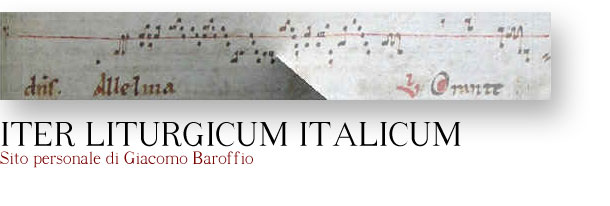Je fais entièrement mienne la position du Père Cardine relativement au caractère non-mesuré du chant grégorien. Voici comment, dans les grandes lignes, elle peut s'énoncer :
1. Si l’on parle du chant grégorien, il faut le distinguer de ce qui n’est pas le grégorien. En particulier, les hymnes ne font partie de cet ensemble.
2. Le grégorien et notamment son rythme nous sont connus par une tradition manuscrite dont le témoignage est globalement unanime et est donc fiable. C’est pourquoi l’on ne peut pas contredire les données certaines des manuscrits.
3. En musique, on parle de mesure chaque fois qu’il y a un système quantifié du rythme. Il ne faut pas parler de mesure lorsque, au cours d’une exécution, le soliste croit bon d’apporter une nuance accidentelle, sans rien de systématique.
4. Dom Cardine, durant les 60 années de sa vie monastique, n’a pas trouvé dans le grégorien de système quantifié, bien au contraire. Il a réfuté les essais de lecture dans ce sens.
5. Si Guy d’Arezzo ou Aribon ou un quelconque théoricien du moyen âge parle de mesure dans le grégorien, c’est qu’il traite d’autre chose que du grégorien (hymne, trope, séquence). Ou bien, c’est qu’il traite du répertoire grégorien tel qu’il était chanté - de facto - autour de lui. Ou bien, c’est qu’il se trompe d’une manière ou d’une autre – puisque la méthode historique nous apprend que l’argument intrinsèque a toujours le pas sur l’argument extrinsèque (tardif*). À cet égard, lors de la discussion sur la non-équivocité de l’oriscus, j’ai déjà mis sur le site « Musicologie médiévale » l’article de Dom Cardine intitulé « Théoriciens et théoriciens », article de 1957 qui n’a rien perdu de sa pertinence.
* *
M. Viret s’enflammait jusqu’à dire : « Les ennemis de mes ennemis sont mes amis. » Je suis prêt à m’enflammer, mais je préfère un autre proverbe : « Amicus Plato, sed magis amica veritas. »
* *
Voici les références d’articles de Dom Cardine :
12. Théoriciens et théoriciens. à propos de quelques exemples d’élision dans la mélodie grégorienne, dans Études Grégoriennes 2, 1957, p. 27-35.
18. Le chant grégorien est-il mesuré ?, dans Études Grégoriennes 6, 1963, p. 7-38.
Le même en anglais, sous le titre : Is gregorian chant measured music ?, Solesmes, 1964, 69 p., traduit par A. Dean.
35. Faut-il distinguer valeur syllabique et valeur mélismatique ?, dans Studia musicologica academiae scientiarum Hungariae, 21, 1979, (texte tronqué à l’impression).
Le même, dans sa version intégrale, dans Rivista internazionale di Musica sacra, 1/1, Milan, 1980, p. 9-15.
43. Les limites de la sémiologie en chant grégorien, dans Études Grégoriennes 23, 1989, p. 5-10.
* Une recension du livre de Jacques Viret, Le chant grégorien, musique de la parole sacrée était ainsi rédigée : « Il est possible qu’un personnage comme Gui d’Arezzo se soit attaché à ce genre de composition [l’hymne solfégique Ut queant laxis interprétée de manière ésotérique...] ; cela reste l’œuvre d’un homme du XIe siècle, tributaire de son temps et de son milieu. On ne voit pas comment une telle symbolique pourrait être rétroactivement projetée sur une composition grégorienne close depuis plusieurs siècles. » (Études Grégoriennes 23, 1989, p. 165).





